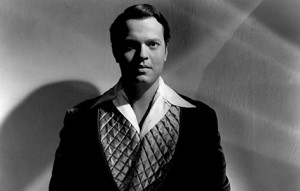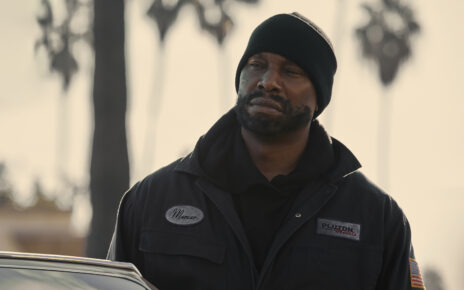Citizen Kane remains a litmus test for aspiring filmmakers and critics. It goes something like this: take any aspiring film junkie teen and enforce his/her first visit to Citizen Kane; you will know within two hours whether or not you have an actual artist on your hands. I daresay I failed it when given the opportunity. Oh, I composed a personal 100 best films list when I was 17. At the top were films like Casablanca, Duck Soup, The Godfather. Citizen Kane didn’t make my top 1,000. I didn’t see it as a brilliantly shot fascinating bold send-up of William Randolph Hearst. I saw it as an indulgent biopic representing a mind knowing exactly everything worth knowing about film, except how to entertain an audience. Rosebud wasn’t so much a symbol of a dying man’s lost youth torn prematurely from him so much as a signal that the film was about to end.
So, hey, I wasn’t born for this work. Everybody knows it. But I do love film and respect Orson Welles; tell me something I don’t know about him. Hmmm, he was into food, financing and fussines, in that order. Yeah, I knew that. What else you got?
Magician: The Astonishing Life and Work of Orson Welles is broken into several brief and relatively indistinguishable biographic chronological sections. Only Welles’ ever expanding waistline and familiarity of titles marked the passage of time for me. Basically, he arrived in theater as a teen with pair of brass balls. Then he went to Hollywood and pissed off producers with films that critics loved and audiences shunned. The latter isn’t stressed; this film is as hard hitting as a toddler in a bunny suit working the heavy bag. Still shots and semi-rare Welles footage are intermixed with cutaways of fawning successors. No, I didn’t expect Martin Scorsese, Peter Bogdanovich, Steven Spielberg or George Lucas to have anything but admiration; yet I felt the commentary was very surface level. Only once, when we get to see Welles’ ignored suggestions for the Touch of Evil recut, do we get a true understanding of the man’s filmmaking genius instead of sycophantic fawning.
Welles comes off as the consummate artist. Not necessarily genius, but artist. Orson Welles was, apparently, such a perfectionist that several of his films were never released because they didn’t match his standards. My interpretation of this is Welles is such an artist that he couldn’t gauge good film from bad. I’m not kidding here; I respect Orson Welles, but I really don’t think he was able to see anything from a spectator’s point-of-view.
This unnecessarily long title hints at the lack of genius within, as if the title itself has to compensate for the short-comings of the film. For the most part, the film is a love letter to a very difficult man. Once he became an adult, he fought with producers and fell back on Shakespeare – time and time and time again. There’s no question the world misses him, but I’m not sure this was the best venue to demonstrate it.
♪Orson Orson pro-duce-a-dee-do
Making a film during course #2
Orson Orson pro-duce-a-dee-dough
Retreats to Europe when finance says “no”
What do you get when you crave perfection?
Maybe two or three wins upon reflection
Why must you always rub others so raw?
Is this the bone you need to gnaw?
I don’t like the look of it♫
Rated PG-13, 94 Minutes
D: Chuck Workman
W: None
Genre: Snot-umentary
Type of person most likely to enjoy this film: Orson Welles believers
Type of person least likely to enjoy this film: People who don’t understand b&w films
♪ Parody inspired by “The Oompa Loompa Song”



